#nomio
Explore tagged Tumblr posts
Photo









Apollo’s various romantic (?) exploits
#i was watching it for the three billionth time and suddenly realized that scene in the middle is her turning into a tree#like Daphne#so i'm like !!!!#these are all depicting Apollo's pursuits of various people (all unrequited one way or another)#how cool is that#Dorilla in Tempe#Véronique Valdès#Apollo#Nomio#mezzos#mezzo-soprano#divas#genderfluid character#opera#opera tag#opera gifs#dorilla gifs
10 notes
·
View notes
Text


37 notes
·
View notes
Text
Hermes Deity Deep Dive
This was a requested deep dive on Hermes, you can request a deep dive on my ko-fi for $5!
Hermes is one of the 12 Olympian Gods and is known as the herald or the messenger of the gods. Often depicted wearing winged shoes and holding a staff or wand, he was known to be the patron of heralds and messengers.
As with many deities, Hermes is the god of many things, such as poets, athletics, luck, travel, trade, omens, animal husbandry, and thieves. This multi-faceted god was often conflated with the Roman Mercury, though there are some key differences.
With that, let’s get to know Hermes!
Parents and Siblings
Zeus (father)
Maia (mother)
Lovers or Partners
Theses are the more common lovers found referenced with Hermes.
Aphrodite
Brimo
Daeira
Peitho
Persephone
Penelopeia
Children
These are all of the cited children I found, there may be some discrepancies depending on which myth you read and who tells the story.
Evander
Pan*
*The primordial god Pan has many origins, being the son of Hermes and Penelopeia is just one of these origins. The next three are thought to be aspects of Pan that may also be personified separately. Pan may be a tripartite deity, this will have to wait until Pan gets his own Deep dive.
Agreus
Nomios
Phorbas
Hermaphroditus
Abderus
Autolycus
Eudoros
Angelia
Myrtilus
Palaestra
Aethalides
Arabius
Astacus
Bounos
Cephalus
Cydon
Pharis
Polybus
Prylis
Saon
Epithets
The Greek gods have massive lists of names, here are some I’ve found on multiple lists.
Atlantiades
Argeïphontes
Cyllenian
Kriophoros
Notes
One of the more popular myths of Hermes is the myth of him stealing Apollo’s cattle as a baby. Hermes was freshly born, escaped his crib and stole his half-brother’s herd of cattle. In order to avoid getting caught, Hermes plays some devious and clever tricks, though the tricks he plays depends on the myth-teller. At some point on his journey with the cattle he finds a tortoise whose shell he turns into the very first lyre. Inevitably he gets caught by Apollo but the sun god is so charmed by the lyre that he allows Hermes to keep the cattle or at least forgives him.
Not only this myth, but others depict him as a trickster who enjoys a good prank.
Hermes was known to be the patron god of Arcadia as he was born in Mount Cyllene in Arcadia according to Homer.
Philostratus places Hermes’ birthplace in Olympus, however.
Hermes is also a psychopomp, a traveler between the realms of the living and dead who aides souls headed to the underworld.
It’s possible that Hermes’ name derives from the Greek herma which meant “heap of stones” or “cairn”. These heaps of stones, or cairns, were roadside markers for travelers and may have also acted as small shrines for the deity.
Hermes was notably charming even as a baby, considered a darling of the gods (ref) where many of the deities in the pantheon would teach or entertain young Hermes.
Hermes was said to have invented wrestling and racing.
One of his more prominent cults was in Attica during the Classical period. By this time he was considered to be the god of travelers and sailors.
Thoth was another deity conflated with Hermes.
Hermes in many myths and traditions is seen to be a liminal deity. Not only is he able to travel between the underworld and overworld with ease, but he is often depicted as both young and old, as a mediator between god and man, and as a dream bringer.
It’s possible that this ties into his involvement as an initiator for young adulthood.
The Hermea were festivals held in honor of Hermes.
Hermes’ staff or wand, the caduceus (staff with two snakes wound around it), is often mistaken for the Rod of Asclepius (staff with one snake wound around it).
Modern Deity Work
Explanations are placed next to each item on the list.
Correspondences
Rocks/Stone/Crystals
Copper - I couldn’t find a source for this but I’ve seen it on multiple posts now and my friends who follow Hermes cite this as well so it is worth a mention!
Gold
Silver
Rocks - Just rocks, specifically stacked rocks from the roadside. Cairns were
Herbs/Plants
Crocus flower - based on the myth where he accidentally kills Krokos and turns him or his blood into a flower.
Strawberry Trees (botanical name Arbutus unedo) - he had been nursed under one according to some myths.
Animals
Hare - he placed the hare amongst the stars as the constellation Lepus.
Tortoise - created the lyre out of a tortoise shell.
Cattle - stole Apollo’s cattle as a baby and is known to be a god of cattle rearing.
Hawk - he transformed two men, Hierax and Daidalon, into hawks.
Symbols
Caduceus - the name of the staff or wand he is depicted as carrying.
Shepherd’s Pipes - he created the shepherd’s pipes.
Winged shoes - the type of shoe varies by myth or artistic depiction but the “winged” part remains the same.
Winged hat - he is often depicted wearing a winged hat.
Traveler’s hat - he is often depicted wearing a traveler’s hat.
Offerings
Shepherd’s Pie - This is purely based on the fact that it’s similar to shepherd’s pipes and I find it amusing, I’m sure a god who enjoys jokes would enjoy this too but that’s my bias.
Koumara - I found this post by @grecowitch explaining that while strawberries are often cited as offerings for Hermes, this misconception comes from the misleading name of the “strawberry tree” which actually produces fruit called koumara! That said, I imagine Hermes wouldn’t be upset at receiving delicious strawberries.
Animal skins - Hermes
Coins - he is known to be a patron of not only merchants but thieves!
Other standard offerings to Grecian deities are olive oil, honey, cheeses, various fruits, milk, and candles.
Acts of Devotion
Write poetry - he is a god of poetry.
Travel - he is the patron god of travelers.
Learn how to play the lyre - he created the lyre.
Play sports - he is known as a god of athletics and during his festival days people would play sports.
Play pranks - I won’t advocate for harsh pranks, personally, but he is known as a trickster so do with that what you will.
Pray to him - pretty standard devotional act.
Go to the gym or otherwise exercise - he has been cited as the patron deity of gyms.
Build a cairn - DO NOT STACK ROCKS IN NATURE as it disrupts the natural environment! However, feel free to build one on your porch or in your house with rocks you may already have.
Celebrate Hermea - I was unable to find a set date-range for these festivals. Some suggested around the beginning of August, possibly due to his conflation with the Irish god Lugh’s holiday Lughnasadh; others suggested May 15 due to the Roman god Mercury’s holiday Mercuralia. That said, he was known to be worshipped during other holidays in Greek tradition alongside other deities.
References and Further Reading
Encyclopedia Mythica
The THEOI Project
Wikipedia
Britannica
194 notes
·
View notes
Text

Pan - Greek God of Shepherds, Hunters & the Wilds Talon Abraxas
PAN was the god of shepherds and hunters, and of the meadows and forests of the mountain wilds. His unseen presence aroused panic in those who traversed his realm.
Pan idled in the rugged countryside of Arkadia (Arcadia), playing his panpipes and chasing Nymphs. One of these, Pitys, fled his advances and was transformed into a mountain-pine, the god's sacred tree. Another, Syrinx, escaped but was turned into a clump of reeds from which Pan crafted his pipes. And a third, Ekho (Echo), was cursed to fade away for spurning the god, leaving behind just a voice to repeat his mountain cries.
Pan was depicted as a man with the horns, legs and tail of a goat, a thick beard, snub nose and pointed ears. He often appears in scenes of the company of Dionysos.
In the classical age the Greeks associated his name with the word pan meaning "all". However its true origin lay in an old Arcadian word for rustic.
Pan was closely identified with several other rustic deities including Aristaios (Aristaeus), the shepherd-god of northern Greece who shared the god's titles of Agreus (Hunter) and Nomios (Shepherd), the pipe-playing Phrygian satyr Marsyas who challenged Apollon to a musical contest, and Aigipan (Aegipan), the goat-fish god of the constellation Capricorn. Sometimes Pan was multiplied into a host of Panes, or a triad of gods named Agreus, Nomios, and Phorbas.
37 notes
·
View notes
Text
Prayer to Aristaios
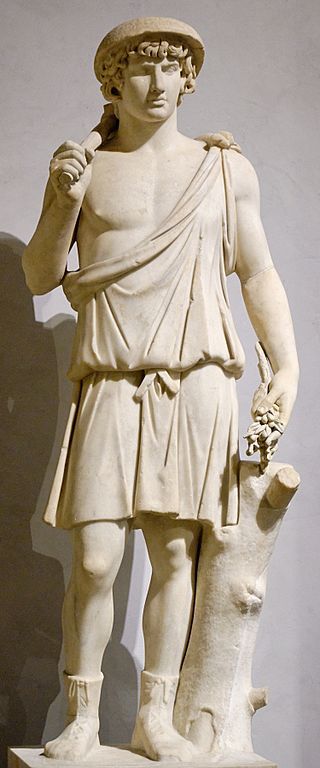
Statue: Antinous as Aristaeus, Artist Unknown
Sing, O Muse, of gentle Aristaios,
Most useful God of the country,
Nomios and Argeus,
Friend of bees and companion of the Melissai,
Protector of flocks and pastures,
Cheesemaker and hive-keeper,
Nurturer of the olive and vine.
Your many great deeds are renowned
Throughout the isles of the broad
Aegean, Ionian, and Adriatic.
Educated by Chiron, you learned
Gifts of prophecy and healing
From the graceful Mousai.
Son of bright Apollon and bold Kyrene,
Husband of Autonoe
And father to poor, doomed Actaeon.
As dogs vanquished your son,
So do you vanquish the Sun's dog days.
Remember us now,
O exhilarating God,
At this time when Sirius
Rises in the sky,
Bringing pestilential heat
And mind-fogging mania.
As you did for the people of Ceos,
Bring the refreshing Etesian winds
To our lands scorched by summer's drought.
At Zeus' command
Harness the reticent breezes
And pour them onto our meadows and pastures.
Bring the Thunderer's thirst-quenching rain
To our fields and plants and flowers.
Relieve blessed Gaia and her copious children
From the swelter of plague-bringing humidity.
As you have for ages unnumbered,
Show merciful kindness to us
In our time of need,
O benevolent alleviator of strife.
Waft upon us pure streams
Of cool, languid comfort once again,
O Mighty One.
--- by Kyle Kepulis
98 notes
·
View notes
Text
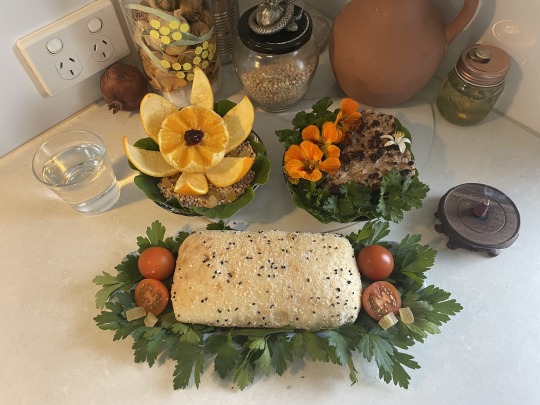
Adeia 2023: Modern Festival to Demeter
On a global scale, we’re dealing with a climate crisis that is putting food sources at risk. On a more local level, conflicts and abnormal weather are creating risks of bad harvests, resources shortages and/or inflations. We are aware that not everyone is impacted directly by the current ongoing issues, but we hope that this festival (or at least the idea) can be useful beyond these and be seen through a wider scope of praying for food security at large. We named the festival Adeia, from the ancient Greek ἄδεια, which conveniently can signify both “abundance”/”plenty” and “freedom from fear”/”security”. All things the festival aims for. - @thegrapeandthefig’s original post
With El Niño threatening, a positive Indian Ocean Dipole, and record warmest winter almost Australia-wide, the upcoming summer is looking to be dry, hot, and ripe for bushfires.
The gods I am propitiating for my Adeia are Demeter Soteira (saviour), Herakles Alexikakos (averter of evil), Zeus Hyetios (moist/fertilising rain), Hermes Nomios and Apollon Nomios (protectors of pastures and shepherds), Olea (nymph of my garden), and Djarlgarra (local river god).
My menu includes:
Butterflied pork sausages with garden flowers and parsley
Flower shaped oranges with cranberry centres and honey on a bed of barley
Bread on a bed of garden parsley
Rain water in a pitcher
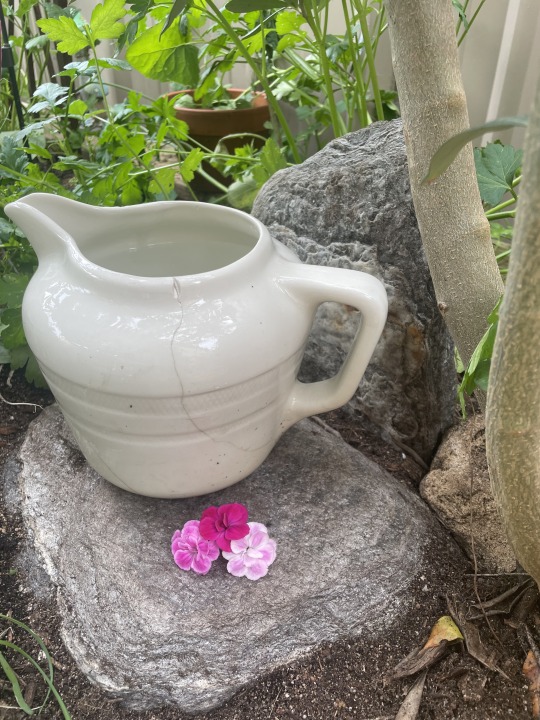
We call upon you in our time of need Benevolent gods, givers of good.
Crises threaten world-over and hardships befall many, and now again we raise our voices in plea.
If these smoky offerings please you, and these sweet drinks warm you, look well upon us. Kindly gods, bless our coffers and larders again, and see abundance flow to our house. And should strife visit our doors, grant us the fortitude to endure.
May Demeter’s lawful eye oversee policy development, so great changes can sprout in years to come
May Zeus meter his life-giving rains, so dry or soggy fields remain moist year-through
May Hermes keep a watchful eye on the flocks and farm-hands, that flystrike and heatstroke never hinder them
With outstretched arms I sing praises to you, bold Djarlgarra, he who holds moisture for our sun-stricken land
And to sweet Olea I gift equally sweet fruits, that you may keep my rain barrels at bursting and my garden fertile

60 notes
·
View notes
Text
LIST OF GODS:
Aionisos, time
Unn, greenery
Vronti, thunder
Pluviam, rain
Galtieo, crystals
Bellum, war
Imagus, imagination
Syiafa, sleep
Moira, luck
Agapi, work
Amatiri, bravery
Dynamie, strength
Le'nettle, Beauty
Vissium, Love
Radiance, light/dreams
Grimm, nightmares
White Lady/Denera, fertility
Kanzu, sound [likely not appearing]
Pale King/Nomio, knowledge
Ni'kana, chaos [has his own blog, @chaotic-grin]
7 notes
·
View notes
Text
Outros Deuses e seus Epítetos - Aristeu
Continuando nossa série de posts sobre Deuses diversos e seus epítetos, prosseguimos agora para um outro filho de Apolo, relativamente pouco conhecido nas narrativas mitológicas: Aristeu, o deus da apicultura, mel, queijo e pastoreio.
Filho da ninfa caçadora Cirene e de Apolo, Aristeu é uma divindade associada a inúmeros feitos heroicos com os quais ele conquistou a apoteose, ou seja, tornou-se divino e não apenas semideus. Majoritariamente descrito como uma deidade benevolente, Aristeu foi treinado pelas Musas e por Quíron nos relatos mitológicos, de quem aprendeu artes proféticas e de cura. Em suas estátuas tardias, é representado como um jovem com roupas de pastor ou um homem maduro portando um cajado pastoril.
Cultuado como um Deus bucólico, pastoril e multifacetado, Aristeu é uma figura fascinante que carrega um curioso significado: Seu nome significa "O melhor".
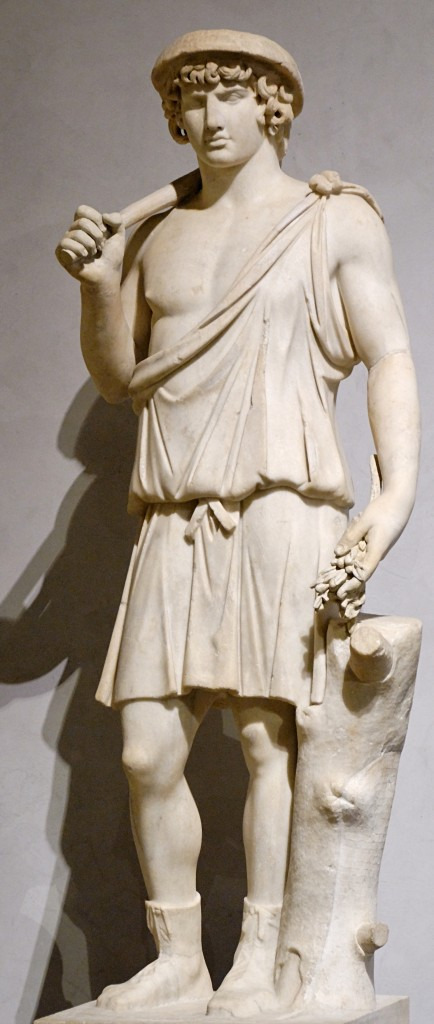
Na antiguidade Aristeu foi cultuado em um punhado de localidades diversas: Desde Haemonia na região da Tessália, no norte da Grécia, até mesmo em Cirene, na Líbia, região assim homônima com sua mãe-ninfa. Ele também foi cultuado em outras regiões do mediterrâneo, como Ceos e Euboia na Grécia e também na Itália, na região da Sardínia, onde era associado com o cultivo de oliveiras.
Seus epítetos associados são escassos, mas temos conhecimento dos seguintes:
Agreus (Αγρευς) - Caçador Nomios (Νομιος) - Pastoril
Os relatos descrevem suas jornadas por todo o mediterrâneo após a morte inoportuna de seu filho, Actaeon, destroçado por seus cães após ter desrespeitado Ártemis ao assisti-la banhar-se com suas ninfas. Ele vagueou pela Hélade, salvou Ceos dos ventos quentes da canícula - um período de tempo onde há ventos abrasivos que deve o nome à constelação Canis Minor - ao erguer um altar para Zeus Icmeus, com o qual foi sincretizado e se enveredou por inúmeras outras localidades do mediterrâneo, tendo reinado supostamente na Sardínia e se iniciado nos mistérios dionisíacos. É dito que ele propagou as artes da apicultura, da caça, do pastoreio e da feitura do queijo como parte de suas bênçãos para a humanidade.
O caráter de Aristeu como divindade é complexo, tendo ele dividido nome e funções com diversas outras divindades: Um dos companheiros de Dionísio chamado Astraios, um dos titãs de nome Astreu (do grego Astraios, escrita similar e também associado a constelações e sendo descrito como pai dos Deuses-vento), também dividindo o domínio pastoril e bucólico com Pã, a divindade do Mundo Selvagem.
Uma versátil e venerável divindade, Aristeu figura como um dos mais ilustres filhos de Apolo já louvadas desde os tempos antigos.
Encerramos o post com um poema dedicado ao Deus da apicultura e da vida pastoril:
Deus mui honrado Filho de ilustre heroína Doce como o mel cultivado Da desgraça e quentura, a ruína Vem Aristeu, propício em nome Saúda o Deus-pastor, gentil Seja o herói aqui lembrado Cuidador de mortais, pastoril.
#aristeus#aristaios#aristeus deity#politeísmo helênico#hellenic polytheism#helpol#epítetos#epithets#outros deuses
15 notes
·
View notes
Text




mis apunticos nenita, con un puntico en chia (nomio) dos carritos dandoche un pikito ✌️🤞✌️🤞✌️🤞 libertad para Chia q saquen las universidades alla ponfis
#chia#te odio#spotify#soundcloud#blackpink#classical art#classical paintings#mcr#classic art#painting#roses_are_rosie#vintage art
4 notes
·
View notes
Text
Names for a Saytr!
Callias
Chevon
Evander
Fern
Nomios
Pacer
Panos
Phaon
Silvanus
Sylvan
Sunbeam
Zephyrus
11 notes
·
View notes
Text
Forever unskippable
#opera#opera tag#baroque#baroque opera#dorilla in tempe#weirdly just feeling happy today and this was the perfect track to pop up on my current playlist#Spotify
4 notes
·
View notes
Text
Introducing: Amity
A Xaela from the Steppes, Amity (real name: redacted) grew up with her grandma (shaman of their lil section of the Qalli tribe), her father (chief), her mother (married in from another tribe (good arm)), and four brothers (currently unnamed). When her power and skill with white magic manifested, her grandmother took her under wing to learn to wield it effectively and listen to the earth.
After the arrival of a man from the Oronir who spoke to her father about inter-clan unity, Amity took off to any other part of the world. She cited wanting to collect the world's songs as her reason, and ended up near Eorzea before the Calamity struck. Gridania wasn't ready to receive her, but after some time spent wandering Eorzea and the surrounding lands and healing within the Black Shroud, she was allowed to train under E-Sumi-Yan.
Her progress led her to become a white mage of some skill, in time to heal the old tree at the heart of the forest with the Senna twins. Even so, her heart yearned for more than the forest. She left Gridania and the Shroud behind, not forever, but for a time.
Five years post-Calamity: Amity wandered within Ul'dah, feeling something important calling her, a thin and quiet voice that often told her where she needed to be. Following its whispers yielded a crossed path with a little Mikitten named K'atreen.
Notable Story Elements
A too-calm exterior hiding a constant breakdown. Even with her Echo leading her to be where she needs to be and heightening her battle focus, she always feels like she's one step away from total disaster.
Notable Relationships
Haurchefant: Engaged (declares herself his wife post-Vault)
Hermes: One-night Stand, ended up pregnant with Nomios after Endwalker
2 notes
·
View notes
Text

Location
Panaema is a (boarding) school for the children and descendants of the divine, hidden beyond a veil of mist, of magic. Named so because the school was built upon a blood soaked field. To get there, one needs to find a patch of nature. In this day and age, a park will do (provided that there aren't any prying mortal eyes, even though the existence of mythological monsters, deities and creatures is kind of an open secret at this point). Once there, one only needs to sing the song that Orpheus sang when he attempted to free his wife from the Underworld. If sung correctly, the Earth weeps, and the entrance to Panaema will reveal itself.
Monsters
All the monsters are real - from the Aeternae to the Ketea Indikoi - but the one who causes the most trouble is Cacia, a daemon with ties to Hercules. In Panaema canon, she is not just a daughter of the night but also a daughter of magic.
Major Characters
Khalida Samay: adoptive granddaughter of Geras Senectus, descendant of Pandaie, daughter of Hercules. (FC: Iman Vellani)
Chthonia "Thonia" Argyris: an amazon in training and the daughter of a giant that Hercules killed, who has nightmares about Amphritrite turning her and her siblings into birds after they pitch themselves off a cliff. (FC: Ally Ioannides)
Alcides "Al" Hasapi: a gargarean in training, who has yet to prove himself and strongly prefers peace over bloodshed despite the fact that his name essentially translates to strong butcher. Gargareans are pretty much the male equivalent of Amazons. (FC: Odiseas Georgiadis)
Eryx Bellini: the son of Aphrodite, who shares his first name with an ancient son of Poseidon. Not a huge fan of boxing, despite what others might say. Khalida's love interest. (FC: Gavin Casalegno)
Kassiani Jeong-Demopoulos: descendant of the oracle Xenoclea. (FC: Lola Tung)
Ione: descendant of Asclepius, has healing powers. Is also Thonia's ex. (FC: Elena Kampouris)
Agreus and Nomios Katsaros: twin sons of Pan.
Descendants of Macaria, Eucleia and Manto (all of them are daughters of Heracles in Panaema canon): they form a group of three.
Other important characters
Linus: son of Apollo, teacher at the school. Fears dogs. Loves astrology. Always wears gloves. Ione is his favorite pupil and she swears up and down that he's actually not that bad of a guy, just the human equivalent of a grumpy cat. Turns out that he can make people sick with just a single touch.
Hercules: The man, the myth, the legend.
Notes of importance
All the myths are real. All the lore is real. The focus in this story will be on how Indian and Greek lore intersects. And also on Hercules.
The government(s) know(s) about everything being real and they struck a deal: their help against monsters and in turn, they are granted a safe space to train the heroes of tomorrow. Think Motherland Fort Salem x Percy Jackson x Legacies.
In regards to fancasting the characters: I'll try my best to go for Greek actors and actresses where I can but seeing as this is my big brain baby, I'm also just going to fancast my favorite actors and actresses.
Some of the characters mentioned have died in their myths. How are they alive again? They resurrected people through the Adonis programme: souls were snatched from Elysium and Asclepius made them new bodies. Hercules being one of the first.
The mathematics probably doesn't add up timeline wise but I have dyscalculia.
More kids / descendants of Hercules will pop up at some point.
Tracy Spiridakos, Marie Avgeropoulos, Adele Exarchopoilos, Athena Karkanis and Melina Kanakaredes will also be fancasted into this project as teachers at some point.
2 notes
·
View notes
Text

Mendy

2. Darikona

3. Nuna

4. Hanna

5. Dino

6. Naraa

7. Tsolmon

8. Undraa

9. Dieu

10. Anu

11. Nami

12. Sondor

13. Lynkhua

14. Nomio

15. Amy

16. Undrakh

17. Khulanii

18. Zaya

19. Khatnaa

20. Akuna
0 notes
Text

#ICYDK: Nokia, Nomios Group to triple capacity for GÉANT European research network https://www.computerweekly.com/news/366548374/Nokia-Nomios-Group-to-triple-capacity-for-GEANT-European-research-network?utm_source=dlvr.it&utm_medium=tumblr
0 notes
Text
Outros Deuses e Seus Epítetos - Pã
Continuando nossa série de postagens onde exploramos os títulos, domínios e mitos das deidades, dessa vez focamos em uma divindade bastante peculiar em seu próprio mérito: Pã, o Deus do mundo selvagem, dos pastores e caçadores.
Majoritariamente descrito como um filho de Hermes, Pã tem a maternidade variada entre diversas possíveis mais: Desde as ninfas Dríope, Oeneis, Tímbris e até Calisto ou mesmo a mortal Penélope, esposa de Odisseu, com a qual Hermes teria se apresentado na forma de um carneiro.
Os mitos de sua origem variam, mas relatam que sua mãe assustou-se ao ter um bebê meio-bode, meio-humanoide. A aparência de Pã é descrita como a de um sátiro, um dos daimones que habitam a floresta, famosos por sua fertilidade, amor por festividades e por representarem o aspecto selvagem da natureza ao lado das ninfas. Ele é retratado como um sátiro barbado portando uma siringe, uma flauta descrita como sua criação. É dito que o Deus foi recebido com alegria por todos no Olimpo, com Dionísio particularmente se afeiçoando a ele e tomando-o como parte de seu cortejo báquico em outros mitos.
Uma divindade associada a toda a vida pastoril, Pã é descrito como um amante da vida bucólica, responsável pela fertilidade do mundo natural, muitos de seus devotos dedicavam-no oferendas em prol de multiplicação de seus rebanhos, boas caçadas e boas pescas. A Pã também eram associadas as sensações de terror que invadiam viajantes que cruzavam o mundo selvagem, sendo o Deus capaz de afugentar quem bem desejasse longe de sua mata.
É dito que o poeta Píndaro fez Pã dançar ao som de sua música e pelas bênçãos a ele concedidas, Píndaro ergueu um altar para ele.
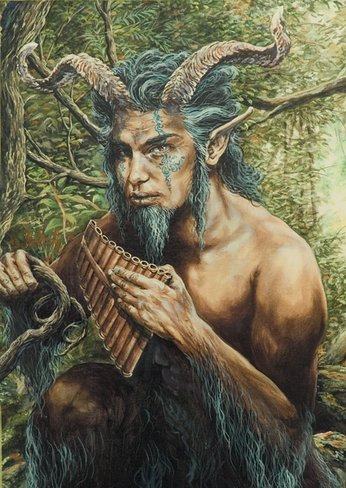
Em relação a seu culto, Pã era majoritariamente cultuado na região da Arcádia, onde Hermes também tinha considerável culto. Cavernas e locais montanheses eram bastante associados ao culto do Deus-sátiro. Na região de Atenas, na Ática, Pã tinha um santuário no sopé da Acrópole onde foi honrado anualmente com sacrifícios e corridas com tochas após ter auxiliado os atenienses na guerra contra os persas.
Observemos agora os títulos usados para descrevê-lo.
Pã (Παν) - Do grego antigo, "Tudo". É o principal nome atribuído ao Deus. A origem do nome é debatida, mas no Hino Homérico a Pã é relacionado ao fato de todos (pantes) os Deuses regozijarem sua presença e risada.
Epítetos de culto
Nomios (Νομιος) - Pastoril Agreus (Αγρευς) - Caçador Agrotas (Αγροτας) - dos Pastos Forbas (Φορβας) - Assustador
Estes títulos descrevem as funções de Pã como uma divindade associada ao domínio pastoril e ao mundo natural por excelência. Seus outros epítetos reforçam também o caráter amplo do Deus-sátiro, como um amante das travessuras, do festejo e de seu aspecto expansivo no Mundo Selvagem, sobre as montanhas ou mes no mar.
Lyterios (Λυτηριος) - Libertador, epíteto especificamente aplicado após o Deus Pã livrar a região de Trezena de uma praga. Sinoeis (Σινοεις) - Travesso Skoleitas (Σκολειτας) - Tortuoso Akrorites (Ακρωριτης) - do Monte Acrória Haliplanktos (Ἁλιπλανκτος) - Aquele que cruza o mar. Pã também era chamado aegokêros, ou seja, dos chifres de bode, para descrever sua condição de sátiro.
Uma divindade importantíssima para a compreensão do mundo natural, Pã é o divino protetor da natureza, fonte de bênçãos imensas e mistérios importantíssimos para a vivência sobre a terra.
Possamos honrá-lo em nossa comunhão com o mundo natural! Encerramos este post com um fragmento dedicado a ele:
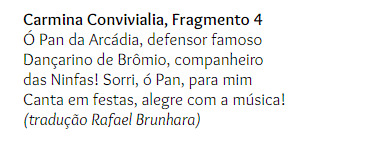
14 notes
·
View notes